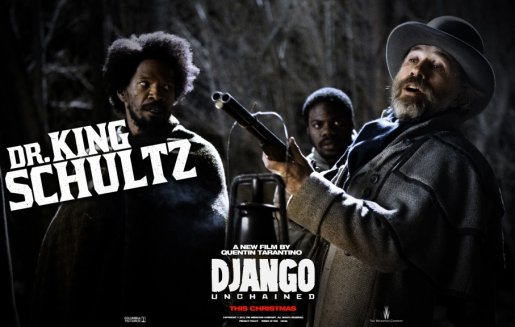Django Unchained: A Happy Ending?


The recent film from polemical director Quentin Tarantino, ‘Django Unchained', is a ‘Spaghetti Western', a genre that emerged during the 1960s. It is a story about a freed slave, who with the help of a German bounty hunter sets out to rescue his wife from a brutal Mississippi plantation owner. This critical review will focus on two characters that play a pivotal role alongside the hero Django (played by Jamie Foxx).
Django´s Wife
The ‘captive' Broomhilda, is the principal motor of the story; Django desires revenge on those who tortured her and the will to rescue her is what compels him into the adventure. The story is typical of Westerns films; what is known as the ‘captivity narrative'.
Usually the white woman, representing the values of Christianity and civilisation, is held captive by savages who, through torture and rape, put in peril the values she represents. She is finally rescued after courageous resistance to physical and psychological exploitation. However, in the complicated ideological bloodbath of Django´s story, Broomhilda´s rescue does not represent the triumph of civilisation over savagery, or the opposite.
Her freedom is only relevant to the love story- it restores the peace and creates a happy ending for the couple, but the message for the audience is not completely clear. The effect of the rescue shows a pronounced ideological silence. What's more, we mostly see Broomhilda through Django´s memories, imaginations and fantasies and even when we see her in reality, it is mostly through his gaze.
This is achieved by cutting her off from any other social relationship- she is significant only in relation to Django. Broomhilda is therefore an illusion; she does not ask for sympathy, identification, or even understanding. She only exists for Tarantino´s happy ending, but doesn't offer historical meaning.
Dr. Schultz
In the same way that Broomhilda´s freedom depends on Django, Django´s freedom depends on the German bounty hunter, Schultz. Indeed, the latter even says: "I´ve never given anybody their freedom before, I feel responsible for you". He represents the civilised man who lives in contact with the savage, developing a wild side.
In contrast to Broomhilda and Django, Schultz is talkative, active and morally chaotic. We can relate him with a paternal figure, as he guides Django and teaches him how to use a gun and to be a bounty hunter. Moreover, he embodies the archetype of the frontier man: a free soul rebel who represents both the values of the savage and the civilised world.
We could find this archetype in characters such as Kurtz in Joseph Conrad's Heart of Darkness and in many other stories invoking a mythical scenario of encounter with the savage world: the jungle, the island and the Wild West.
A Happy Ending?
In Django´s story, we encounter a rich imagery that conjures archetypes that resolve deep cultural concerns. Shultz is the ultimate embodiment of freedom as he has the power to free. He frees Django, whose freedom talks about justice, and Django, in turn, frees his wife, whose freedom talks only to the love story, disguising the fact that somehow, she is still a captive.
Johanna Perez is a Colombian student currently studying an MA in Anthropology and Cultural Politics at Goldsmiths. You can read more posts by her here.








